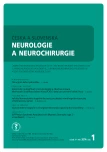-
Medical journals
- Career
Neuropathic Pain Relief through Distraction Technique – a Case Report
Authors: J. Raudenská 1; A. Javůrková 2; J. Kozák 3; J. Amlerová 4
Authors‘ workplace: Oddělení klinické psychologie, 2. LF UK Praha a FN v Motole, Praha 1; Oddělení klinické psychologie, FN Královské Vinohrady, Praha 2; Centrum pro léčbu a výzkum bolestivých stavů, 2. LF UK Praha a FN v Motole, Praha 3; Neurologická klinika 2. LF UK Praha a FN v Motole, Praha 4
Published in: Cesk Slov Neurol N 2014; 77/110(1): 114-116
Category: Case Report
Overview
Distraction techniques are common behavioral interventions in terms of cognitive-behavioral therapy for pain management. Distraction techniques help patients to temporarily shift the focus of attention away from their pain and other unpleasant bodily sensations. They are frequently combined with other techniques. The case study describes a patient with chronic neuropathic pain due to a car accident who underwent a surgery but his back and leg pain persisted. A distraction technique in combination with relaxation training provided the patient with short-term pain relieve experience and helped him to cope with pain better.
Key words:
chronic neuropathic pain – cognitive-behavioral therapy – distraction technique – relaxation training
The authors declare they have no potential conflicts of interest concerning drugs, products, or services used in the study.
The Editorial Board declares that the manuscript met the ICMJE “uniform requirements” for biomedical papers.
Sources
1. Bednařík J, Ambler Z, Opavský J, Keller O, Rokyta R, Mazanec R et al. Klinický standard pro farmakoterapii neuropatické bolesti. Cesk Slov Neurol N 2012; 75/108(1): 93–101.
2. McCracken L. Attention to pain in persons with chronic pain: a behavioural approach. Behav Ther 1997; 28 : 271–84.
3. Eccleston C, Crombez G, Aldrich S, Standard C. Attention and somatic awareness in chronic pain. Pain 1997; 72(1–2): 209–215.
4. Moore DJ, Keogh E, Eccleston C. The interruptive effect of pain on attention. Q J Exp Psychol 2012; 65(3): 565–586.
5. Jones AKP, Brown WD, Friston KJ, Qi LY Frackowiak RS. Cortical and subcortical localization of response to pain in man using positron emission tomography. Proc Biol Sci 1991; 244(1309): 39–44.
6. Hofbauer RK, Rainville P, Duncan GH, Bushnell MC. Cortical representation of the sensory dimension of pain. J Neurophysiol 2001; 86(1): 402–411.
7. Bingel U, Tracey I. Imaging CNS modulation of pain in humans. Physiology (Bethesda) 2008; 23 : 371–380.
8. Valet M, Sprenger T, Boecker H, Willoch F, Rummeny E, Conrad B et al. Distraction modulates connectivity of the cingulo-frontal cortex and the midbrain during pain – an fMRI analysis. Pain 2004; 109(3): 399–408.
9. Sprenger Ch, Eippert F, Finsterbusch J, Bingel U, Rose M, Büchel C. Attention modulates spinal cord responses to pain. Current Biology 2012; 22(11): 1019–1022.
10. Gatchel RJ, Peng YB, Peters ML, Fuchs PN, Turk DC. The biopsychosocial approach to chronic pain: scientific advances and future directions. Psychol Bull 2007; 133(4): 581–624.
11. Raudenská J. Model kognitivně-behaviorální terapie u dospělých pacientů s chronickými bolestivými stavy. Cesk Psychol 2012; 56(5): 473–487.
12. Johnson MH. How does distraction work in the management of pain? Curr Pain Headache Rep 2005; 9(2): 90–95.
13. Jameson E, Trevena J, Swain N. Electronic gaming as pain distraction. Pain Res Manag 2011; 16(1): 27–32.
14. Flor H, Turk DC. Chronic Pain: An Integrated Biobehavioral Approach. Seattle: IASP Press 2011.
15. Buhle J, Wager TD. Performance-dependent inhibition of pain by an executive working memory task. Pain 2010; 149(1): 19–26.
16. Eccleston C. Chronic pain and distraction: an experimental investigation into the role of sustained and shifting attention in the processing of chronic persistent pain. Behav Res Ther 1995; 33(4): 391–405.
17. Winterowd C, Beck AT, Gruener D. Cognitive Therapy with Chronic Pain Patients. New York: Springer Publishing Company 2003.
Labels
Paediatric neurology Neurosurgery Neurology
Article was published inCzech and Slovak Neurology and Neurosurgery

2014 Issue 1-
All articles in this issue
- Surgical Treatment of Hydrocephalus
- Movement Activities in Patients with Multiple Sclerosis
- A Notice on Classification, Terminology and Contents Innovations to the Primary Headaches Section of the International Classification of Headache Disorders (ICHD-3 Beta)
- Is Long-term Disability in Multiple Sclerosis Associated with Diffuse Cerebral Pathology Independent of Relapses?
- Prediction of Postoperative Clinical Outcome in Cervical Spondylotic Myelopathy
- Validity of the Montreal Cognitive Assessment in the Detection of Mild Cognitive Impairment in Parkinson’s Disease
- Quality Assessment of a Clinical Guidelines Czech Neurological Society
- Quantitative Flowmetry of Parent and Branching Arteries during Surgical Treatment of Cerebral Aneurysma
- International Standards for Neurological Classification of Spinal Cord Injury – Revision 2013
- Intraspinal Juxtaarticular Cysts of the Lumbar Spine
- Microsurgical Resection of Symptomatic Pineal Cysts
- Czech Version of the Autonomic Scale for Outcomes in Parkinson’s Disease (SCOPA-AUT) – Questionnaire to Assess the Presence and Severity of Autonomic Dysfunction in Patients with Parkinson’s Disease
- Importance of Electromyography in the Reconstructive Surgery of the Upper Extremity
- Cranial Nerve Palsies and Necrotizing External Otitis – Two Case Reports
- Neuropathic Pain Relief through Distraction Technique – a Case Report
- Local Thrombolysis in Severe Cerebral Venous and Sinus Thrombosis – Two Case Reports
- Stiff‑ person Syndrome Associated with Myotonic Dystrophy Type 2 – a Case Report
- Deep Brain Stimulation in Olomouc – Techniques, Electrode Locations, and Outcomes
- Underuse of Oral Anticoagulation in Primary Prevention of Cardioembolic Stroke – Results of a Descriptive Prevalence Study
- Czech and Slovak Neurology and Neurosurgery
- Journal archive
- Current issue
- Online only
- About the journal
Most read in this issue- Microsurgical Resection of Symptomatic Pineal Cysts
- Surgical Treatment of Hydrocephalus
- Stiff‑ person Syndrome Associated with Myotonic Dystrophy Type 2 – a Case Report
- International Standards for Neurological Classification of Spinal Cord Injury – Revision 2013
Login#ADS_BOTTOM_SCRIPTS#Forgotten passwordEnter the email address that you registered with. We will send you instructions on how to set a new password.
- Career

